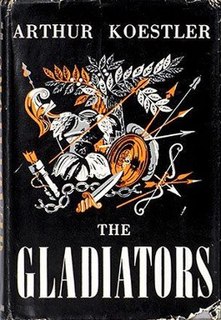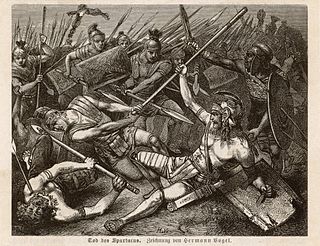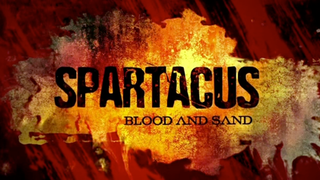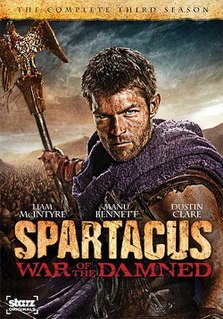Plot summary
The central character is not Spartacus himself, but Kleon, a fictional Greek educated slave and eunuch who joins the revolt. In the first chapter we are told how he was sold into slavery as a child and sexually abused by an owner.
Another important character is Elpinice, a female slave who helps Spartacus and his fellow gladiators escape from Capua, and who becomes Spartacus's lover. She gives birth to a son, but while Spartacus is fighting elsewhere she is raped and murdered by soldiers, and the child is also killed. The novel touches on Gibbon's views on human history, with Spartacus seen as a survivor of the Golden Age.
However, in spite of various additions and speculations, it does stick fairly closely to the known historical facts about the revolt. Plutarch's life of Crassus is clearly the main source, but it does make use of some other classical sources, including Appian and Sallust.

Marcus Licinius Crassus was a Roman general and statesman who played a key role in the transformation of the Roman Republic into the Roman Empire. He is often called "the richest man in Rome."

Spartacus is a 1960 American epic historical drama film directed by Stanley Kubrick, written by Dalton Trumbo, and based on the 1951 novel of the same title by Howard Fast. It is inspired by the life story of Spartacus, the leader of a slave revolt in antiquity, and the events of the Third Servile War. It stars Kirk Douglas in the title role, Laurence Olivier as Roman general and politician Marcus Licinius Crassus, Peter Ustinov as slave trader Lentulus Batiatus, John Gavin as Julius Caesar, Jean Simmons as Varinia, Charles Laughton as Sempronius Gracchus, and Tony Curtis as Antoninus.
Gaius Verres was a Roman magistrate, notorious for his misgovernment of Sicily. His extortion of local farmers and plundering of temples led to his prosecution by Cicero, whose accusations were so devastating that his defence advocate could only recommend that Verres should leave the country. Cicero's prosecution speeches were later published as the Verrine Orations.

Lewis Grassic Gibbon was the pseudonym of James Leslie Mitchell, a Scottish writer. He was best known for A Scots Quair, a trilogy set in the north-east of Scotland in the early 20th century, of which all three parts have been serialised on BBC television.

The Third Servile War, also called the Gladiator War and the War of Spartacus by Plutarch, was the last in a series of slave rebellions against the Roman Republic known as the Servile Wars. This third rebellion was the only one that directly threatened the Roman heartland of Italy. It was particularly alarming to Rome because its military seemed powerless to suppress it.

Arrival and Departure (1943) is the third novel of Arthur Koestler's trilogy concerning the conflict between morality and expedience. The first volume, The Gladiators, is about the subversion of the Spartacus revolt, and the second, Darkness at Noon, is the celebrated novel about the Soviet Show trials. Arrival and Departure was Koestler's first full-length work in English, The Gladiators and Darkness at Noon having originally been written in German. It is often considered to be the weakest of the three. Reviewing the novel in December 1943 George Orwell called it notable "for what must be one of the most shocking descriptions of Nazi terrorism that have ever been written."
Crixus was a Gallic gladiator and military leader in the Third Servile War between the Roman Republic and rebel slaves. Born in Gaul, he was enslaved by the Romans under unknown circumstances and trained as a gladiator in Capua. His name means "one with curly hair" in Gaulish.
Spartacus was the Thracian who led a slave uprising against Roman slavery.

The Gladiators (1939) is the first novel by the author Arthur Koestler; it portrays the effects of the Spartacus revolt in the Roman Republic. Published in 1939, it was later reprinted in other editions.

Spartacus is a 1951 historical novel by American writer Howard Fast. It is about the historic slave revolt led by Spartacus around 71 BC. The book inspired the 1960 film directed by Stanley Kubrick and the 2004 TV adaptation by Robert Dornhelm.

Spartacus is a 2004 North American miniseries directed by Robert Dornhelm and produced by Ted Kurdyla from a teleplay by Robert Schenkkan. It aired over two nights on the USA Network, and stars Goran Visnjic, Alan Bates, Angus Macfadyen, Rhona Mitra, Ian McNeice, Ross Kemp and Ben Cross. It is based on the 1951 novel of the same name by Howard Fast.

Spartacus was a Thracian gladiator who, along with Crixus, Gannicus, Castus, and Oenomaus, was one of the escaped slave leaders in the Third Servile War, a major slave uprising against the Roman Republic. Little is known about him beyond the events of the war, and surviving historical accounts are sometimes contradictory. All sources agree that he was a former gladiator and an accomplished military leader.

Spartacus: Blood and Sand is the first season of American television series Spartacus, which premiered on Starz on January 22, 2010. The series was inspired by the historical figure of Spartacus, a Thracian gladiator who from 73 to 71 BC led a major slave uprising against the Roman Republic. Executive producers Steven S. DeKnight and Robert Tapert focused on structuring the events of Spartacus' obscure early life leading up to the beginning of historical records.

Spartacus: Vengeance is the second season of the American television series Spartacus, a Starz television series, which follows Spartacus: Blood and Sand. It premiered on January 27, and concluded on March 30, 2012. Its story follows Spartacus, after he and his fellow gladiators kill their master Batiatus and escape from his ludus, or gladiatorial training school. Cast members and characters who return from the first season include Lucy Lawless as Lucretia, Peter Mensah as Oenomaus, Manu Bennett as Crixus, Dan Feuerriegel as Agron, Nick E. Tarabay as Ashur, Viva Bianca as Ilithyia, and Craig Parker as Gaius Claudius Glaber. Dustin Clare also reprises his role as Gannicus from Spartacus: Gods of the Arena, the prequel to Spartacus: Blood and Sand.
Spartacus is an American television series produced in New Zealand that premiered on Starz on January 22, 2010, and concluded on April 12, 2013. The fiction series was inspired by the historical figure of Spartacus, a Thracian gladiator who from 73 to 71 BC led a major slave uprising against the Roman Republic departing from Capua. Executive producers Steven S. DeKnight and Robert Tapert focused on structuring the events of Spartacus' obscure early life leading up to the beginning of historical records.

Spartacus: War of the Damned is the third and final season of the American television series Spartacus, a Starz television series, which follows Spartacus: Vengeance. The series was inspired by the historical figure of Spartacus, a Thracian gladiator who, from 73 to 71 BC, led a major slave uprising against the Roman Republic. It premiered on January 25, 2013, and concluded on April 12, 2013.

The Battle of Vesuvius was the first conflict of the Third Servile War which pitted the escaped slaves against a military force of militia specifically dispatched by Rome to deal with the rebellion.

The Gladiator is a tragic melodrama in five acts written by Robert Montgomery Bird originally starring Edwin Forrest. It first premiered on September 26, 1831, at the Park Theatre in New York City.













